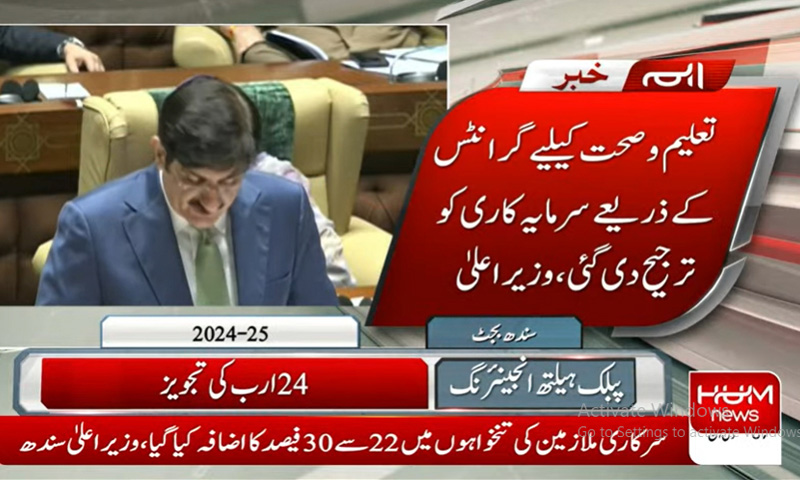- Web Desk
- 8 Hours ago
Sindh unveils over Rs1tr budget with up to 30pc salary hike for govt employees
-

- Web Desk
- Jun 14, 2024

KARACHI: Sindh Chief Minister Murad Ali Shah is presenting the budget for the fiscal year 2024-25 in the Sindh Assembly, which includes a substantial salary increase of 22 to 30 per cent for government employees. Employees from grade-1 to grade-16 will get 30 per cent raise while from grade-17 to grade-22 will get 22 per cent raise in their salaries.
The session, being chaired by Speaker Owais Qadir Shah, saw the Sindh chief minister unveiling an estimated budget exceeding Rs1 trillion.
Shah said that pension would be increased by 15 per cent and the minimum wage will be jacked up from Rs32,000 to Rs37,000. The Sindh chief minister stated that social and economic welfare has been prioritised in the provincial budget. The purpose of the 22-30 per cent increase in salaries and the 15 per cent increase in pensions is to strengthen financial security.
According to the budget document, the overall development budget for Sindh has been set at Rs959 billion. This includes allocations for ongoing development schemes.
In the budget, Rs32 billion have been earmarked for education and Rs18 billion for health sectors. Additionally, Rs3 billion have been allocated for energy department development projects.
The budget proposal indicates that there will be no additional funds allocated to the provincial assembly.
During the budget speech, the chief minister announced a proposed development expenditure of Rs959 billion rupees, which accounts for 31 per cent of the total budget. The balanced budget primarily focuses on the rehabilitation of flood-affected individuals and social security for the poor, he said.
Also read: CM Sindh directs crackdown on crime, drugs
He said that the total expected revenue of the province is Rs3 trillion. Of this, federal transfers make up 62 per cent, while provincial receipts account for 22 per cent. He said that current capital receipts stand at Rs22 billion, foreign project assistance at Rs334 billion, federal grants in PSDP at Rs77 billion, foreign grants at Rs6 billion, and carryover cash balances include Rs55 billion.
Shah said that provincial receipts of Rs662 billion include Rs350 billion from sales tax on services, Rs269 billion from GST plus other taxes, and Rs42.9 billion from provincial non-tax receipts. Current revenue expenditure is Rs1.9 trillion (63%), current capital expenditure is Rs184 billion (6%), and development expenditure is Rs959 billion rupees (31%), he said.
According to the budget document, salaries constitute the largest share of expenditure at 38 per cent, followed by grants at 27 per cent for various programmes, and non-salary costs at 21 per cent, including operational costs, transfers, interest payments, and repairs. Pensions and retirement expenditures make up 14 per cent of current expenditure. Current capital expenditure includes Rs42 billion for debt repayment and Rs142.5 billion for other payments and public investment.
In terms of development expenditure, Rs493 billion have been allocated for foreign project assistance in the provincial ADP, Rs334 billion for other foreign project assistance, and Rs77 billion for other federal grants through PSDP. Additionally, Rs55 billion have been allocated for district ADP.
Education sector will receive the largest allocation of Rs519 billion rupees, with Rs459 billion for current expenditures. Health sector will get Rs334 billion, with Rs302 billion for current expenditure.
Local government is among the top three with a proposed budget of Rs329 billion. In the budget, significant resources have also been allocated for essential sectors of basic infrastructure, including Rs58 billion for agriculture.
For 77 energy projects, Rs62 billion have been allocated. Additionally, Rs36 billion have been allocated for current expenditure, Rs94 billion for irrigation, Rs86 billion for works and services and Rs30 billion for planning and development.
Transport has been allocated Rs56 billion, SG&CD Rs153 billion and Rs194 billion have been allocated for home department.
Relief Measures
The Sindh chief minister stated that a significant amount of Rs34.9 billion were being allocated to help the poor. The budget includes a Rs116 billion for subsidy programmes to reduce the financial burden on citizens. Additionally, Rs25 billion will be allocated for housing schemes to promote safe shelter.
New Steps
In his budget speech, Shah highlighted that the provincial budget was focusing on immediate relief measures. Many new initiatives have been introduced for the development of the economy and social welfare of the province.
He said that Rs8 billion are being allocated to provide financial assistance to 12 million farmers. Rs5 billion have been allocated to build an enclave complex in Malir Expressway Korangi, which will provide education, rehabilitation, training, accommodation, medical services, entertainment, and other facilities.
For the first time, he said, a specific budget has been allocated for 485 police stations. Rs5 billion will be allocated for a solarisation initiative over five years. Additionally, Rs5 billion have been allocated for the construction of a new canal like Hub Canal to supply water to Karachi.
Rs5 billion are being allocated for workers under the labour card, Rs11 billion for agriculture, Rs12 billion for social security, Rs3.2 billion for universities and boards, Rs2 billion for housing and town planning, and Rs1.5 billion for DEPD.
Grants in Aid
Murad Ali Shah stated that in the Sindh budget, investment has been prioritized through significant grants for education and health. The total amount of major grants is Rs190 billion, with Rs35 billion allocated for universities across Sindh. This funding aims to strengthen educational institutions and improve access to quality health services.




